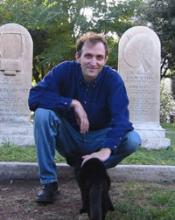What Is It
Reading is a lot of fun, especially narrative fiction – everyone loves a good story. But maybe there's more to it than that. Maybe everyone is, or at least tries to be, a good story themselves. Perhaps our very personal identities rest on narratives we form about ourselves, narratives that give our lives meaning, continuity, and coherence. Will the younger generation fashion lives based on the chaos and violence-based levels of computer games, rather than the carefully constructed lives of great fiction? Or is that just one of the old-fogey hosts grumbling? John and Ken swap stories with Joshua Landy, co-director of the Literature and Philosophy Initiative at Stanford University, for a program recorded in front of a live audience at Congregation Beth Shalom in San Francisco.
Listening Notes
Ken begins with an age-old question: “What exactly is a self anyway?” Philosophers tend to think of the self as more than the psychologistic bundle of properties particular to a certain person. They claim that an agent exists behind those properties, who constructs the external self that we see everyday. But this ‘construction’ sounds an awful lot like narrative! Are we all the storytellers of the story of our lives, one in which we are the protagonists? Do we narratively construct our selves? If so, does reading, by teaching us the art of narrative, teach us to create who we are?
Joshua Landy, Director of the Philosophy and Literature Program at Stanford, joins the conversation once again, this time to help us sort out the relationship between narrative and the self. A good place to start: What is a narrative? Josh tells us that the minimal narrative contains a beginning, an end, and an action by agents. Ken and John seem unsure: Does narrative require an agent? Is the narrative of Moby Dick merely the series of events depicted in the novel? Or does the reader/critic themselves bring an essential element to the narrative, relativized to their experience? Josh refuses to allow narrative to be a "mere" sequence of events. He argues that it requires something more to make a narrative, perhaps a causal chain that knits the events together. He mentions a quote: "History is just one damned thing after another." So, Josh argues, perhaps we impose narrative on history when we fit its events into a causal structure of our choosing.
Ken questions Josh on the relationship between truth and narrative: Can we create a self-narrative that utterly fails to capture the actual events of our lives? John claims everyone is missing the point, that life is simply "one damned thing after another," that our narrative perception of that life may have nothing to do with our actual selves. But why, then, do we read stories? Josh disagrees with John, arguing that tales teach us to be aesthetic appreciators of our own lives. Narrative appears to give us a certain sort of inalienable autonomy, the right to narrate our own lives. John is unsure whether good lives are necessarily interesting. The well-lived life might have little aesthetic content.
This launches the discussion into the importance of aesthetic values in self-narrative. Josh believes that aesthetic virtues are among the most important in any narrative, including our own. John scoffs, arguing that the most wonderful lives, such as his own, have little to no aesthetic value, since they are just plain boring. Ken argues that we can’t escape aesthetic values, even in a life as boring as John’s. But, as always, the conversation continues.
- Roving Philosophical Reporter (seek to 5:55): Angela Kilduff takes a closer look at the role of the library in forming our self-narrative imaginations. Luis Herrera, San Francisco City Librarian, talks about his own taste in books. Then, he offers a view of how the library allows everyone to participate in the great cultural narrative of a city, as well as promoting awareness and education.
- 60-Second Philosopher (seek to 45:50): Ian Shoales narrates a tale from his own self-narrative. Inspired by the giant squids of the film, his childhood self travelled to the library to check-out On Her Majesty’s Secret Service, and his life was never quite the same.



